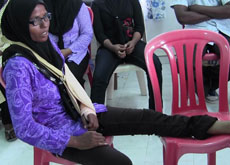The Maldivian Democracy Network (MDN) has urged the Maldives Police Service (MPS) to speed up its investigations into the many death threats made to journalists and to ensure their adequate protection.
In a press statement released on the occasion of UNESCO’s International Day to End Impunity for Crimes against Journalists, MDN also expressed its concern over the prevalence of aggressive threats made against journalists.
“Journalists in Maldives continue to receive death threats and other violent messages, some in the public domain through social media. They have been targeted with grave physical harm. It is appalling that these incidents should go without investigation and apprehension of perpetrators,” read the MDN statement.
MDN also voiced their concern over the disappearance of Minivan News journalist Ahmed Rilwan who has been missing for 87 days as of today (November 2).
“There has been no progress in finding Rilwan, and allegations of impunity have risen with every passing day,” said MDN.
Rilwan’s disappearance is the first such instance of its kind in the Maldives, although near fatal attacks were carried out on the blogger Ismail Hilath Rasheed in 2012 and the Raajje TV reporter Ibrahim ‘Asward’ Waheed in 2013.
Adopted by a resolution in the UN General Assembly last year, the day is used to urge member states to implement definite measures countering the present culture of impunity.
November 2 was chosen to commemorate to two French journalists killed in Mali on 2 November 2013. UNESCO reports that over 700 journalists have been killed in the last decade, with 2012 and 2013 representing the deadliest years.
Following Rilwan’s disappearance in August, journalists from across the Maldives joined to declare that his abduction was a threat to all, and calling for an end to persistent intimidation faced by the press.
“As intimidation of press grows, and attacks against journalists, equipment, and buildings continue, we are extremely concerned over the delays in bringing to justice those who commit these acts,” read the landmark statement.
Foreign Minister Dunya Maumoon also expressed concern regarding acts of intimidation and reprisals to journalists in general, noting that “freedom of media facilities a greater degree of interconnectedness and awareness in the community, and is the cornerstone of any democratic society”.
Last week, the People’s Majilis threw out a 5055 strong petition urging the parliament’s National Security Committee to pressure the Maldives Police Services to conduct a speedy and thorough investigation.
Rilwan’s family also lodged a formal complaint with the Police Integrity Commission accusing the police of negligence in the investigation into the 28-year-old’s disappearance.
Meanwhile, a media official from MPS told Minivan News today that that investigation into Rilwan’s disappearance is going ahead speedily but reported no new updates to the investigation
The media official also mentioned that police security was provided for two journalists after two convicts who were serving life sentences for murder escaped the Maafushi high security prison in October.
A total of four men have been arrested over Rilwan’s disappearance, although only one man remains in custody at present.
Home Minister Umar Naseer said he believed Rilwan to be alive and promised to return him safe to his family. He has also acknowledged the involvement of criminal gangs in the case.
Last month, MDN released the findings of a private investigation, which discounted theories of voluntary disappearance and suicide, concluding that the disappearance was most likely an abduction by radicalised gangs.
On September 25, a named suspect in the MDN private investigation broke a CCTV outside Minivan News building before two men on motorbikes lodged a machete to the door.
Police arrested the renowned gangster who was caught on footage when he broke the camera only to be released the next day by the Criminal Court demanding the man to cooperate with the investigation and not to cause any further disturbances.
MPS also provided Minivan News with static security outside the building after the attack with one Minivan News journalist receiving death threats in the hours following the attack.
Recently, Amnesty International demanded police intensify their efforts to find those responsible for the numerous death threats and violent attacks against journalists.
Numerous international organisations have criticised the slow progress in the investigation of the case including Reporters without Borders and the International Federation of Journalists.
